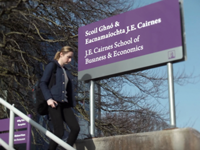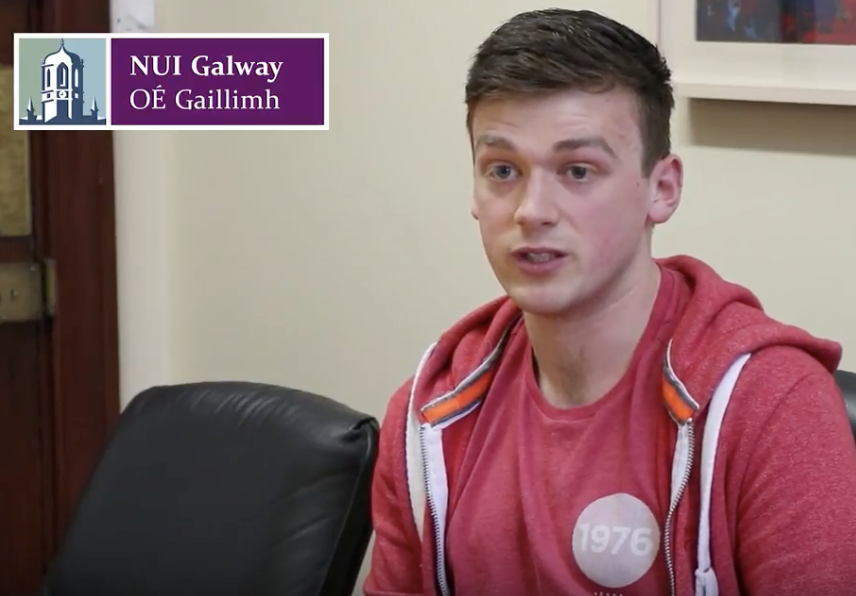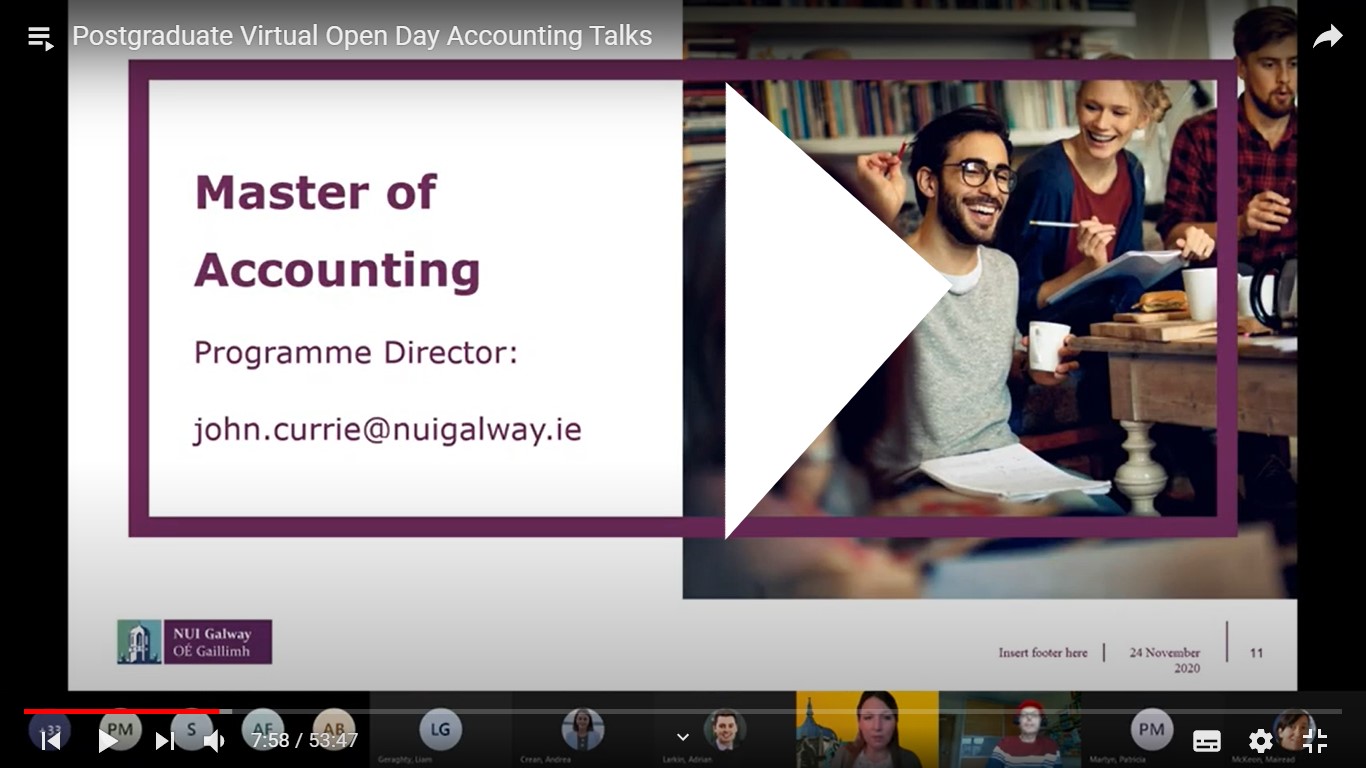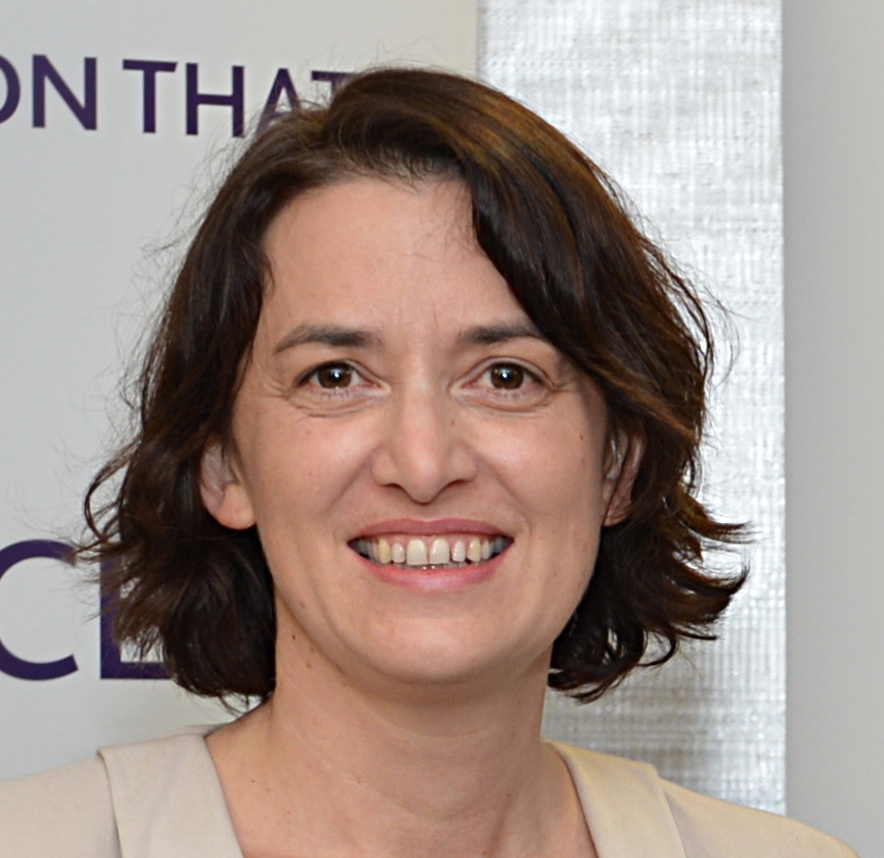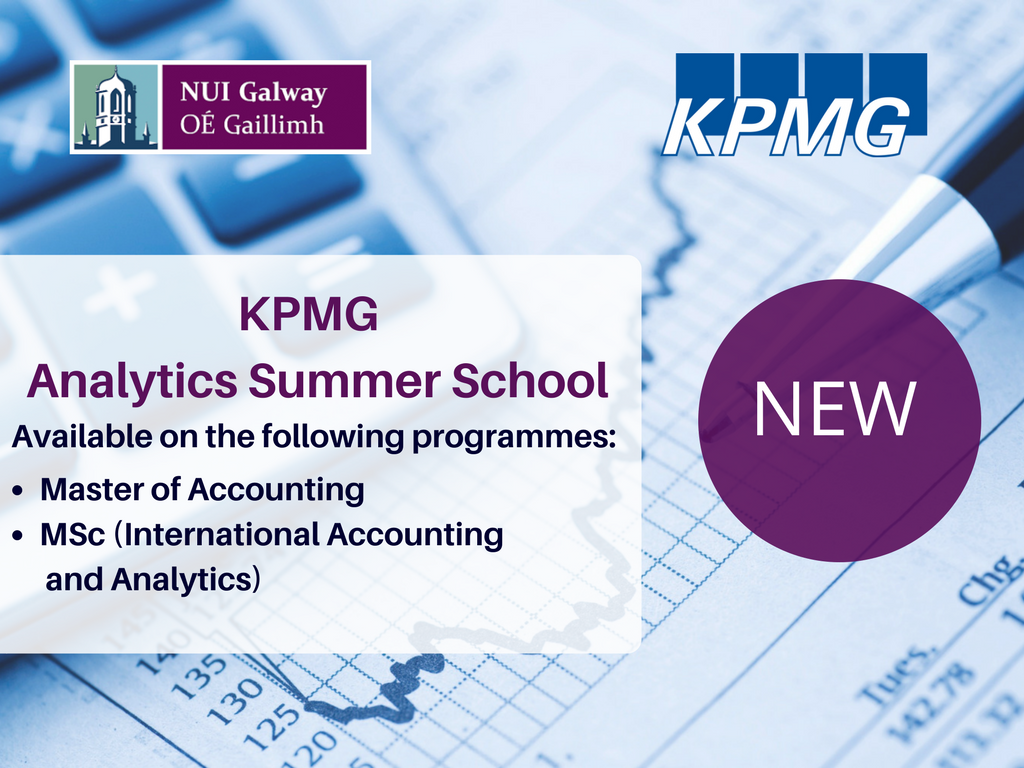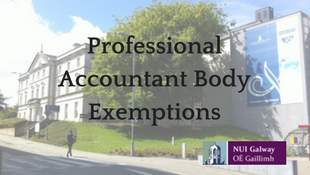-
Courses

Courses
Choosing a course is one of the most important decisions you'll ever make! View our courses and see what our students and lecturers have to say about the courses you are interested in at the links below.
-
University Life

University Life
Each year more than 4,000 choose University of Galway as their University of choice. Find out what life at University of Galway is all about here.
-
About University of Galway

About University of Galway
Since 1845, University of Galway has been sharing the highest quality teaching and research with Ireland and the world. Find out what makes our University so special – from our distinguished history to the latest news and campus developments.
-
Colleges & Schools

Colleges & Schools
University of Galway has earned international recognition as a research-led university with a commitment to top quality teaching across a range of key areas of expertise.
-
Research & Innovation

Research & Innovation
University of Galway’s vibrant research community take on some of the most pressing challenges of our times.
-
Business & Industry

Guiding Breakthrough Research at University of Galway
We explore and facilitate commercial opportunities for the research community at University of Galway, as well as facilitating industry partnership.
-
Alumni & Friends

Alumni & Friends
There are 128,000 University of Galway alumni worldwide. Stay connected to your alumni community! Join our social networks and update your details online.
-
Community Engagement

Community Engagement
At University of Galway, we believe that the best learning takes place when you apply what you learn in a real world context. That's why many of our courses include work placements or community projects.
Accounting (Master of)
Course Overview


Chartered Accountants Ireland Exemptions
The programme syllabus is closely based on the CAP2 syllabus of Chartered Accountants Ireland (CAI). Therefore, significant exemptions from the CAI examinations are available. Graduates of the MAcc are granted full exemption from CAI’s CAP2 examinations, provided that they have full exemption from CAI’s CAP1 examinations before taking the MAcc.
MAcc graduates’ success in recent professional examinations
Our graduates consistently achieve very high places in the Final Admitting Examination of Chartered Accountants Ireland and in the final examination of the Irish Tax Institute (AITI). In the recent professional exams, our graduates Aisling Curtin and Sarah Finnegan obtained second and third place respectively in CAI’s Final Admitting Examination and Nora Cosgrove was placed second in the final examinations of the Irish Taxation Institute.
Summer Schools
The programme hosts two summer schools which are held after the summer exams, typically in May and June. The topics vary from year to year. See details of the 2023 Summer Schools below:
- Summer school #1: Analytics in Accounting and Auditing, delivered by KPMG ( 10th - 16th May 2023) This summer school aims to give participants a rich understanding of the use of software and cognitive technologies to analyse audit and accounting data. The summer school demonstrates KPMG tools which were developed to harness the power of technology and bring greater vigour, precision and meaningful insights to the increasing age of data. Students are provided with an opportunity to see how data and analytics are used in a practical setting, bringing meaning, life and understanding into accounting information.
- Summer school #2: (Financing Net Zero, delivered by Barry Gavin) (29th May - 2nd June) The objective of this summer school is to enable students to be able to hold their own with professionals working in the sustainability sector by developing a knowledge of the concepts, language, structures, process, risks, challenges and opportunities for corporate sustainability. In particular, students will learn to appreciate the role that finance has in enabling the transition to Net Zero.
Applications and Selections
Applications are made online via the University of Galway Postgraduate Applications System.
Who Teaches this Course
The following staff from the Accountancy and Finance Discipline at University of Galway are involved in teaching the MAcc programme:

Accountancy & Finance
Room 354
Cairnes Building
NUI Galway
View Profile

Discipline of Accountancy and Finance
J.E. Cairnes School of Business and Economics
NUI Galway
View Profile

J.E. Cairnes School of Business & Economics
Top Floor
Cairnes Building
NUI Galway
View Profile

Dept. of Accountancy & Finance
Room 362
Cairne's Building
NUI Galway
View Profile

Dept. of Accountancy & Finance
Room 351
Cairnes Building
NUI Galway
View Profile

E: SHARON.COTTER@nuigalway.ie
View Profile
Requirements and Assessment
In each module there is a combination of continuous assessment and end-of-semester exam. Depending on the module, the continuous assessment typically consists of interim exam, student presentations, case studies, written reports, and structured debates. The end-of semester exams are held in December and April/May each year.
Candidates also complete two summer schools in May/June. The summer school topics differ from year to year. Recent summer schools have included: Data analytics in audit and accounting; Financing net zero; Digital disruption and performance measurement.
Key Facts
Entry Requirements
A H2.1 degree (NFQ Level 8 or equivalent) in Business or Commerce, with a significant specialisation in Accounting. IELTS score of 6.5 or equivalent, ifapplicable. Students are required to have full (or nearly full) exemptions from the CAI’s CAP1 examinations before embarking on the MAcc programme.
Additional Requirements
Recognition of Prior Learning (RPL)
Duration
1 year, full-time
Next start date
September 2024
A Level Grades ()
Average intake
35
QQI/FET FETAC Entry Routes
Closing Date
Offers are made on a rolling basis.
NFQ level
Mode of study
ECTS weighting
90
Award
CAO
Course code
MACC-AY
Course Outline
In addition to the Curriculum below students complete EITHER two summer schools OR a research dissertation. Recent and forthcoming summer schools include:
- Management Control Systems and Innovation.
- Audit and Accounting in the 21st Century: Data & Analytics, Artificial Intelligence and Related Technological Tools
Curriculum Information
Curriculum information relates to the current academic year (in most cases).Course and module offerings and details may be subject to change.
Glossary of Terms
- Credits
- You must earn a defined number of credits (aka ECTS) to complete each year of your course. You do this by taking all of its required modules as well as the correct number of optional modules to obtain that year's total number of credits.
- Module
- An examinable portion of a subject or course, for which you attend lectures and/or tutorials and carry out assignments. E.g. Algebra and Calculus could be modules within the subject Mathematics. Each module has a unique module code eg. MA140.
- Subject
- Some courses allow you to choose subjects, where related modules are grouped together. Subjects have their own required number of credits, so you must take all that subject's required modules and may also need to obtain the remainder of the subject's total credits by choosing from its available optional modules.
- Optional
- A module you may choose to study.
- Required
- A module that you must study if you choose this course (or subject).
- Required Core Subject
- A subject you must study because it's integral to that course.
- Semester
- Most courses have 2 semesters (aka terms) per year, so a three-year course will have six semesters in total. For clarity, this page will refer to the first semester of year 2 as 'Semester 3'.
Year 1 (90 Credits)
Optional MG571: Strategic Management - 5 Credits - Semester 1Optional MS5128: Decision Theory, AI and Analytics - 5 Credits - Semester 1
Required AY5104: Investment and Financing Decisions - 5 Credits - Semester 1
Required AY5103: Management Accounting - 5 Credits - Semester 1
Required AY5116: Auditing I - 5 Credits - Semester 1
Required AY5118: Advanced Financial Reporting I - 5 Credits - Semester 1
Required AY5100: Taxation I - 5 Credits - Semester 1
Required AY518: Research Project - 20 Credits - Semester 1
Optional AY5137: Measurement and Reporting for Sustainable Organizations - 5 Credits - Semester 1
Optional MS5104: Decision Theory & Analysis - 5 Credits - Semester 1
Optional SBE5116: Global Studies - 10 Credits - Semester 1
Optional SBE5115: Global Studies - 5 Credits - Semester 1
Required AY5140: Management Control for Sustainable Organizations - 5 Credits - Semester 2
Required AY5117: Auditing II - 10 Credits - Semester 2
Required AY5105: Corporate Finance - 5 Credits - Semester 2
Required AY5101: Taxation II - 5 Credits - Semester 2
Required AY5119: Advanced Financial Reporting II - 10 Credits - Semester 2
Required AY537: Skills for Accounting Research and Practice - 5 Credits - Semester 2
Further Education
Exemptions: Graduates of the MAcc are granted full exemption from CAI’s CAP2 examinations, provided they have full exemption from CAI’s CAP1 examination before taking the MAcc.
Why Choose This Course?
Career Opportunities
A wide range of career choices are open to graduates, in particular in the accounting and tax consultancy professions. In fact most participants on the programme are sponsored (and subsequently employed) by major accounting firms, such as KPMG, PricewaterhouseCoopers, Deloitte and EY.

Chartered Accountants Ireland exemptions
This programme has been developed with reference to the Chartered Accountants Ireland (CAI) syllabus. Therefore, significant exemptions from the CAI examinations are available. Graduates of the MAcc are granted full exemption from CAI’s CAP2 examinations, provided that they have full exemption from CAI’s CAP1 examinations before taking the MAcc.
MAcc graduates success in recent professional examinations
Our graduates consistently achieve very high places in the Final Admitting Examination of Chartered Accountants Ireland and in the final examination of the Irish Tax Institute (AITI). In the recent professional exams, our graduates Aisling Curtin and Sarah Finnegan obtained second and third place respectively in CAI’s Final Admitting Examination and Nora Cosgrove was placed second in the final examinations of the Irish Taxation Institute.
Summer Schools
The programme hosts two summer schools which are held after the summer exams, typically in May and June. The topics vary from year to year.
- Summer school #1: Analytics in Accounting and Auditing, delivered by KPMG ( 10th - 16th May 2023) This summer school aims to give participants a rich understanding of the use of software and cognitive technologies to analyse audit and accounting data. The summer school demonstrates KPMG tools which were developed to harness the power of technology and bring greater vigour, precision and meaningful insights to the increasing age of data. Students are provided with an opportunity to see how data and analytics are used in a practical setting, bringing meaning, life and understanding into accounting information.
- Summer school #2: (Financing Net Zero, delivered by Barry Gavin) (29th May - 2nd June) The objective of this summer school is to enable students to be able to hold their own with professionals working in the sustainability sector by developing a knowledge of the concepts, language, structures, process, risks, challenges and opportunities for corporate sustainability. In particular, students will learn to appreciate the role that finance has in enabling the transition to Net Zero.
Three Reasons to study the MAcc at University of Galway?
1. It will enable you to get on the fast track to qualifying as a chartered accountant.
2. In the MAcc we help you develop the interdisciplinary and interpersonal skills you need to succeed in the professional exams and in your professional accounting career.
3. The class size (30 students) is optimal: Small enough that students can receive individual support and mentoring from lecturers, but also big enough that you get to develop the expertise in group working which employers value very highly.
Who’s Suited to This Course
The MAcc programme could be for you if you hold (or expect to graduate shortly with) at least a 2.1 honours primary degree with a significant specialisation in accounting and expect to have full (or nearly full exemptions) from the CAP1 examinations of CAI. The majority of students on the programme are sponsored by accounting firms who intended to employ them to train as chartered accountants upon graduation from the MAcc.
Learning Outcomes
Transferable Skills Employers Value
Work Placement
Study Abroad
Related Student Organisations
Course Fees
Fees: EU
Fees: Tuition
Fees: Student levy
Fees: Non EU
Postgraduate students in receipt of a SUSI grant—please note an F4 grant is where SUSI will pay €4,000 towards your tuition (2023/24). You will be liable for the remainder of the total fee. An F5 grant is where SUSI will pay tuition up to a maximum of €6,270. SUSI will not cover the student levy of €140.
Postgraduate fee breakdown = Tuition (EU or NON EU) + Student levy as outlined above.
Note to non-EU students: learn about the 24-month Stayback Visa here.
Find out More
Programme Director
Mr John Currie
E: john.currie@universityofgalway.ie
Programme Administrators
Ms Sharon Gilmartin & Ms Tracy Coloe Cloonan
E: accountancy@universityofgalway.ie
What our Employers Say

Marie Joyce | Chief Financial Officer, NTR plc
The finance function is a key driver of analytics and plays a leadership role rather than a supporting role.

Colm Gorman | Head of KPMG
Since its inception, KPMG has sponsored students on the Master of Accounting programme in NUI Galway. We are delighted with the results. In its graduates, KPMG looks for rounded individuals with well-developed thinking and interpersonal skills. We really notice these skills in those who have completed the Master of Accounting in NUI Galway. It is the combined focus on technical skills development and personal development that we believe prepares students well for a career in business
What our Students and Graduates Say

Niamh Irvine | Master of Accounting Scholar 2022-23
This Master of Accounting programme offers insightful information on what a trainee accountant does. It gives you the abilities you need to succeed as an accountant when you enter the workforce and you are able to gain full CAP 2 exemptions as a result of taking this course. The modules are both challenging and engaging. In semester three, there is a summer school with KPMG that, I'm told, will be highly beneficial for acquiring the abilities required and sought by potential employers. The J.E. Cairnes Building has excellent facilities, and the resources offered are excellent. The lecturers and teaching staff go above and beyond to assist students with any problems or concerns that may occur. They are always eager and willing to do so. Being awarded the J.E. Cairnes scholarship has greatly reduced the financial strain brought on by the cost of the course. I would highly recommend this course to anyone who is considering it.

Alisha Mullin | Audit Associate at Deloitte
The Master of Accounting degree at NUI Galway will be incredibly valuable to my future career. The course gave me the opportunity to develop various skills such as research and writing skills from attempting various assignments. As well as this the module “Skills for Accounting Research and Practice” gives students the opportunity to review case studies which I am sure will be of an advantage to me when sitting my FAE’S. The course is taught by a number of brilliant lecturers who have vast amounts of experience in their fields. Each lecturer puts so much time and effort into the preparation and delivery of each module. They provide you with some brilliant real-life examples, drawing on their own experience, making it very easy to understand and apply the content.

John Flood | Master of Accounting Scholar 2021-22
The Master of Accounting at NUI Galway has facilitated a seamless transition into the accounting workplace, particularly after obtaining the CAP 2 exemptions for the professional exams. The course is very much centred around practical skills such as group work, presentations, debates etc, based on relevant real-world problems, as well as having an emphasis on the technical and academic skills which are equally structured well. Having availed of an entire module dedicated to accounting analytical skills as well as an optional 2-week data and analytics summer school run by KPMG, I was very well equipped on the highly demanded skills that employers desire. There are also valuable workshops conducted in semester 2 which offered great insight and preparation for the FAE professional exams. Given the small class size, the lectures are all so approachable and understanding, and really go above and beyond for their class. It was also a pleasure to study alongside my equally ambitious and hardworking classmates, where there’s a real sense of solidarity and strong commitment to work competently.

Sarah Gavin | Master of Accounting Scholar
In completing the masters in accounting I can say that it successfully prepares you for the working world as a trainee accountant. The course has provided us with exemptions for the CAP 2 exams. As well as the academic modules, the course has given me the practical skills that is needed for completing the daily tasks in an accountant’s role. It has also provided us with excellent workshops to help us prepare for the FAE’s which I will have to sit to become a chartered accountant. The teaching staff at NUIG are incredibly supportive, they have also made themselves available to us if we have queries and questions about career paths and opportunities. We have also been given great opportunities to give our input into the structure of the course. Being awarded a scholarship from University of Galway has enabled me to focus solely on my academics and achieve the best results possible in my exams without financial worry.

Ellen Grant | Master of Accounting Scholar
I would absolutely recommend studying the Master of Accounting programme at University of Galway. The programme is based on the CAP2 syllabus and provides a wide range of exemptions. The coursework is very much aligned to equip students with the skills they will need for their future careers with a specific emphasis on group work and an entire module dedicated to practical skills in Semester 2. This year has been a completely different experience due to the move to virtual learning. However, the lecturers and coordinators have done absolutely everything to facilitate a seamless transition. The teaching staff have been nothing but supportive and have created an open and safe environment for student contributions and feedback. The small class size also means there is a real opportunity to get to know almost everyone, which is something you don’t necessarily get with every course. Finally, it must be said that Galway city is an amazing location to study from. The weather may be unpredictable at times however, it more than makes up for it on the good days.

Emma Cummins | Master of Accouting Scholar
On completing a level eight Bachelors of Commerce (Accounting) degree in NUIG, I decided to apply for a place in the Master of Accounting programme. Upon securing a place, I applied for a scholarship having met the eligible criteria of achieving a H1. The scholarship process was straightforward which involved filling out a form and writing a short personal statement. The scholarship helped partly finance my studies. The masters cover a range of modules including tax, audit, financial reporting and finance. On completing the masters CAP2 exemptions will apply. The skills for accounting module provide an insight on case studies in the FAEs which will be beneficial in the near future.

Hanhui Wang | Senior Auditor in Banking Sector
Courses arranged in this programme are essential and helpful for my future career in accountancy. I like that this study year is a challenge for me. I believe the year will help me develop my professional knowledge and skills and will greatly improve my job prospects. All staff teaching on this programme have excellent professional knowledge and teaching skills. They are nice, enthusiastic and helpful to me. I enjoy being here and am having a really good time in Galway. I regard Galway as my second hometown.

Zhang Xiaolin | M.Acc graduate 2016
The subjects in this Master of Accounting programme are very appropriate for your future career. You get to develop and practice your presentation and research skills through various assignments. From the programme, you will not only acquire knowledge but you will also develop an ability to solve real world problems. There is a good mix of international and national students in the class. The group work on various courses allowed me to experience working on problems with students from different cultural backgrounds. Staff are all very professional and friendly. The staff know that as an international student you live far away from your family and friends and they try to help and encourage you.
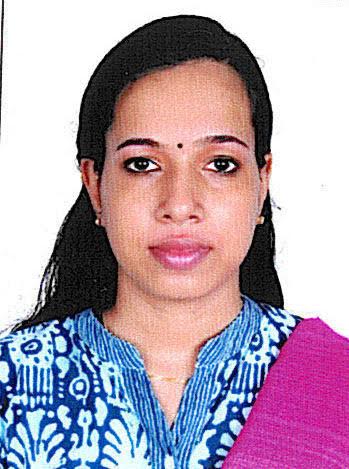
Alphonsa Cherukodath | M.Acc graduate 2016
This programme has helped me to gain practical knowledge through problem solving in the various accounting and finance modules. It has made me more professionally competent as a result of the presentations, case study analysis and debates that are all part of the programme. The teaching faculty of the programme are very professional and all have industry experience which helps me to understand the topics more easily. Galway is a diversified city with very good infrastructural facilities and people are very friendly. The weather in the city was a completely new experience, but I have adjusted!"
Ciarán O’Donnell | Associate, Ernst & Young
“I would certainly recommend studying the Master of Accounting degree at NUI Galway. My experience and time at Galway was without a doubt a positive and very enjoyable one. The facilities at the J.E Cairnes Business School are top class and are entirely conducive to an effective study environment. The programme lecturers are very much approachable, friendly, and hardworking. Furthermore the course offers a great platform for developing those skills necessary in progressing in the workplace and also with the professional exams. Lastly it needs to be mentioned that Galway City itself is a fantastic location to study in and the contacts you develop during the program are, in my opinion, invaluable.”
AACSB - Global Accreditation

AACSB is the longest-serving global accrediting body for business schools, and the largest business education network connecting students, educators, and businesses worldwide
Recognised By:
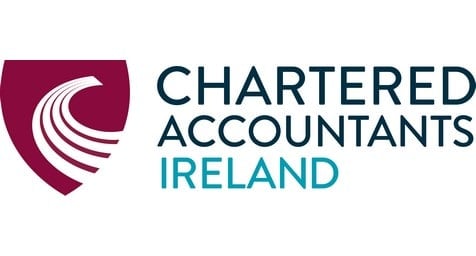
Irish Accountancy Awards 2019
.jpg)








